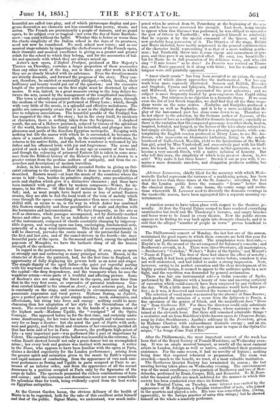"Amer vincit orania " has long been accepted as an
axiom, the moral certainty of which almost approaches the mathematical. Nor has any truth been more copiously illustrated. Samson and Dalilah, Hercules and Omphale, Cymon and Iphig,euia, Solyman and Roxalana, Barnwell and Millwood, have severally personated the great aphorism ; and no subject is more frequently treated by gem-engravers than Cupid riding on a lion. But triteness is no objection to a dramatic theme. If we scan even the list of lost Greek tragedies, we shall find that all the three trage- dians wrote on the same stories. lEschylus and Euripides produced a Philoctetes as well as Sophocles, and it is by a mere accident that the play of the last-named poet has alone come down to us. Therefore we do not object to the selection, by the German author of Inyomar, of the omnipotence of love as a subject fitted for dramatic treatment ; especially as there is the variation that the conquered personage is neither shorn, beaten, inspired, befooled, nor hanged, as the heroes of the tales above referred to, but simply civilized. We admit thatit is a pleasing spectacle, while con- templating the English version produced at Drury Lane, to see Mr. An- derson, who represents an Alemmanic barbarian, living in the neigh- bourhood of Gallo-Greek Messilia, yield to the fascinations of the Messi- Han girl, acted by Miss Vandenhoff, and successively part with his bluff- ness, his beard, his sword, and his barbaric nether-garments, so as to become a very smooth Greek, with a native infusion of honesty. But why tell this story, the simplicity of which is its greatest charm, in fire acts? Why make it last three hours ? Stretch it out as you will, it re- mains a mere dramatic anecdote, and elongation produces nothing but dilution.


























 Previous page
Previous page